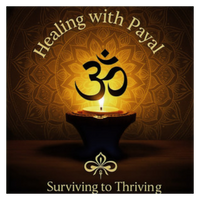Imposter Syndrome: When Your Mind Tells You You’re Not Enough (Even When You Are)
- HealingWithPayal

- Jul 13, 2025
- 3 min read
By Payal Seth | www.healingwithpayal.com

Have you ever achieved something meaningful — maybe a new job, a big project, a compliment on your work — and instead of feeling proud, you thought:
"They must have made a mistake."
"I just got lucky."
"Any day now, they’ll find out I don’t really know what I’m doing."
If yes, you’ve met an old, sneaky visitor called Imposter Syndrome — a pattern of thinking that convinces us we’re frauds, even when we’re not. It’s something I’ve battled personally for years, and today, I want to gently unpack what it really is, how it connects to mental health, and how we can start loosening its grip.
What Is Imposter Syndrome?
Imposter syndrome isn’t a diagnosis — it’s an internal experience of doubting your own accomplishments and feeling like you’ll be “found out” as a fraud. It doesn’t matter how experienced, qualified, or brilliant you are. The mind whispers:
“You’re not good enough.”
“You’re just pretending.”
“You don’t belong here.”
And unfortunately, many of us silently believe it.
How Imposter Syndrome Impacts Mental Health
Living with imposter syndrome over time can create a storm of mental health challenges, including:
Chronic self-doubt
Low self-worth
Anxiety before meetings, exams, or even social events
Perfectionism and burnout (because we overwork to compensate)
Fear of success (because it brings more visibility — and more chances to be “exposed”)
Over time, this can spiral into deeper emotional exhaustion, low self-esteem, and even depression.
It’s not just a “confidence issue.” It’s a lens through which you begin to see yourself — dimming your light even in your brightest moments.
And Sometimes, Mental Health Shapes the Imposter Feeling
It works the other way too. If you live with anxiety, depression, or past trauma, your brain may already be wired to doubt your worth. This emotional vulnerability becomes the perfect soil for imposter thoughts to grow.
When our mental health is fragile, even genuine success can feel unsafe.
A Real-Life Reflection
I remember the first time someone introduced me as a mental health expert. My stomach tightened. I immediately thought, “No, no — I’m just someone who’s struggled a lot. I’m not an expert.”
But here’s the truth: lived experience is valid.
Healing, learning, sharing — these are strengths. Not everyone has walked this path, survived, and come out with stories to tell.
Yet, I needed to gently remind myself of that. Again. And again.
A Few Tools That Help Me (And Might Help You Too)
If you’re battling imposter syndrome today, here are a few gentle tools that might support you:
✅ Name the voice: Sometimes I literally say, “Ah, hello again, Imposter Voice. I see you.” This helps separate me from the negative self-talk.
✅ Keep a Kind Folder: Screenshots of kind messages, thank-you notes, testimonials — anything that reminds me of my real impact.
✅ Reality Check with a Friend: When I feel like a fraud, I check in with someone I trust. Often, they help me reframe and ground myself.
✅ Pause and Breathe: Imposter thoughts often appear in high-stress moments. A slow breath and a self-compassionate phrase like, “I am allowed to be here,” helps more than you'd expect.
✅ Journal Your Journey: Sometimes writing down how far you’ve come, even in tiny steps, reveals more than you realize. The past version of you would be so proud.
If No One Told You This Today...
You don’t need to do more, prove more, or be more to be worthy.
You belong in the rooms you walk into.
You deserve the praise you receive.
You are allowed to be proud of yourself.
A Message from My Heart to Yours - You are Enough!
If you're feeling like an imposter today, please know — that voice isn’t the truth. It’s an echo of fear and conditioning, not your reality.
You are more than the doubts in your mind.
You are the warmth in your words, the effort you put in, the kindness you carry, the work you’ve done quietly — over the years, through the pain, despite the noise.
Imposter syndrome shrinks in safe spaces. So let’s keep building those together — where you can show up as you are, and still feel like you belong.
One breath at a time, one truth at a time — we begin to believe in ourselves again.
With care, Payal xx




Comments